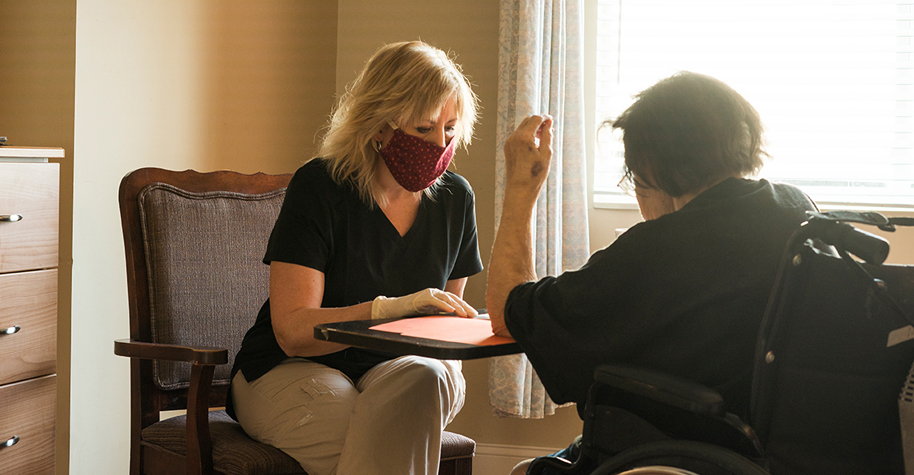Asthma Intervention Program Provides Emotional Support to Patients
Posted on by
This student-authored post is published by CPR in partnership with Medill News Service and the Northwestern University Medill School of Journalism, Media, Integrated Marketing Communications. The views and opinions expressed in this article are the author’s own and do not necessarily reflect the views, policies, or positions of CPR or CDC.
Gloria Seals has for the past 20 years seen firsthand how substandard living conditions can worsen asthma symptoms.
Seals, a community health worker for Asthma CarePartners (ACP) and Supervisor of Asthma Education at Sinai Urban Health Institute (SUHI), made house calls to patients with asthma to provide individualized health education. She and other community health workers taught patients how to manage their asthma, explained how to use the needed medical equipment, walked through patients’ homes to identify any environmental hazards that could worsen asthma symptoms, and demonstrated how to use scrubbing pads to patch holes in the walls to keep out pests.
“Some homes on the South and West sides [of Chicago] are just not livable,” Seals says. She has been in homes with mold, cockroaches, and mice, which are all common triggers for people with asthma.
Working with patients in their homes has shown Seals how the environment where people live can lead to repeated asthma episodes, and how stress and loneliness can worsen an illness.
The house calls ended in March when Seals adapted the program to a virtual platform. The virtual platform has allowed Seals to continue to counsel her patients and help prevent the spread of COVID-19 during the pandemic. Health workers also incorporated COVID-19 prevention information into the curriculum.
COVID-19 has hit communities of color in Chicago, like those on the South and West sides, particularly hard. Black and Hispanic people are also more likely to have asthma and other respiratory conditions, which can put a person at increased risk for severe illness from the virus that causes COVID-19.
According to CDC, people with moderate to severe asthma might be at higher risk of getting very sick from COVID-19. COVID-19 can affect the nose, throat, and lungs; cause an asthma attack; and possibly lead to pneumonia and acute respiratory disease. Disinfectants can also trigger an asthma attack.
At first, health workers were worried about how transitioning to virtual visits would affect patient care. Home visits were an important part of the program because they allowed health workers to interact in-person with patients and helped them identify allergens in and around the home.
What they found, though, was that patients depend on community health workers for more than education; they also look to them for emotional support. Community health workers are appreciated as trusted members of the neighborhoods they serve, and patients value their council, even when offered virtually.
“The social support community health workers provide has become really important now, especially for COVID-19 patients,” said Stacy Ignoffo, Director of Community Health Innovations at SUHI. “A familiar voice can give patients a greater sense of security during this crisis,” she added.
Other health experts agree. Dr. Louise Giles, a pediatric pulmonologist at the University of Chicago, said she has noticed an increased need in the community for mental and emotional health care and support.
“Families are extremely worried right now,” Dr. Giles said. “They are looking to providers for both information and emotional care.”
While telemedicine is not a substitute for in-person home visits, Seals is grateful she can still connect with her patients and serve as an additional source of knowledge and support during this time.
“ACP serves people who would not seek out this education on their own,” she said. “Regardless of format, having us come to them makes all the difference in the world.”
As the COVID-19 pandemic continues, SUHI’s community health workers have become an essential source of education and emotional support for many patients. Their compassion and leadership in the face of adversity has built a well-informed, resilient community across the South and West Sides of Chicago.
ACP will remain virtual until an effective COVID-19 vaccine is developed. There is currently no vaccine to prevent COVID-19. The best way to prevent illness is to avoid being exposed to the virus.
Thanks in advance for your questions and comments on this Public Health Matters post. Please note that the CDC does not give personal medical advice. If you are concerned you have a disease or condition, talk to your doctor.
Have a question for CDC? CDC-INFO (http://www.cdc.gov/cdc-info/index.html) offers live agents by phone and email to help you find the latest, reliable, and science-based health information on more than 750 health topics.
One comment on “Asthma Intervention Program Provides Emotional Support to Patients”
Comments listed below are posted by individuals not associated with CDC, unless otherwise stated. These comments do not represent the official views of CDC, and CDC does not guarantee that any information posted by individuals on this site is correct, and disclaims any liability for any loss or damage resulting from reliance on any such information. Read more about our comment policy ».
I think that it was great innovation that this team came up with the idea of doing virtual visits during the COVID pandemic so that they were still able to connect with their patients. Millions of people are truly scared about COVID and the ones with asthma are even more fearful. Many asthma patients rely on the care received from home care nurses and COVID made that impossible. By doing virtual visits, patients were still able to receive the education needed but were also able to get the peace of mind that they needed from these nurses. These patients trust the community health workers on this team and their council is valued so the fact that they didn’t have to lose these relationships was a positive enforcement for them.